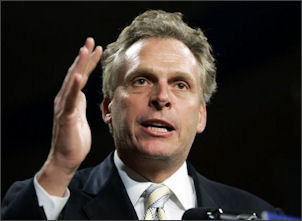by James A. Bacon
Terry McAuliffe, the governor-elect of Virginia, has a tough job ahead of him. Democrats picked up only one seat in the House of Delegates, leaving Republicans with 66 seats, or a veto-proof majority. Most likely, he will have to work with a Republican, Mark Obenshain, in the attorney general’s office. He also has the distinction of being the first man to win Virginia’s governorship in many years, if ever, with less than a majority of votes cast. While he did edge out Republican Ken Cuccinelli by two percentage points, 52% of Virginians voted against him. And he achieved that underwhelming margin by out-spending Cuccinelli and Libertarian candidate Robert Sarvis by $32 million to $19 million. He can’t even pretend to own a mandate.
It’s with good reason that McAuliffe pledged last night to provide pragmatic, bipartisan leadership. “The truth is that this election was never a choice between Democrats and Republicans,” he said at his victory speech. “It was a choice between whether Virginia would continue the mainstream bipartisan tradition that has served us so well over the last decade.”
While McAuliffe reaches out to Republicans, he undoubtedly will be mindful also of the priorities of those who donated to him so generously. To gain insight into who will be whispering in his ear, it is useful to review where his campaign contributions came from.
The first thing that stands out from Virginia Public Access Project data, which has compiled contributions made through October 23, is that $24.4 million of McAuliffe’s $31.7 million raised came from outside the state. Cuccinelli, by the way, was slightly more dependent upon out-of-state contributions; nearly half his money came from the Republican Governor’s Association. But the RGA was not likely to demand favors. McAuliffe’s backers will.
The green lobby. Environmentalists invested heavily in McAuliffe’s victory — $3.8 million. The biggest chunk, $1.7 million, came from the Virginia League of Conservation Voters, the single biggest Virginia-based interest group. NextGen Climate Action, of San Francisco, ladled out another $1.6 million. Those contributions, coupled with a $464,000 contribution from the Virginia chapter of the Sierra Club, assuredly will give the environmental lobby a seat at the table. That’s good news for alternate energy and bad news for the coal industry. What it means for the smart-growth lobby, however, is anybody’s guess. That’s because….
Labor unions. Organized labor also own a big piece of McAuliffe. Unions kicked $2.9 million into McAuliffe’s campaign coffers. Aside from the Service Employees International Union, which primarily represents government workers, donations came mainly from the construction trades. That include the Laborers International Union (the guys behind the Project Labor Agreement controversy in the rail-to-Dulles project), steelworkers, painters, electricians and bricklayers. Expect McAuliffe to work out deals behind the scenes to benefit his union pals in major state construction projects.
Here’s where it gets interesting. Where does McAuliffe stand on big road construction projects such as the Charlottesville Bypass, the Bi-County Parkway and the U.S. 460 Connector that his environmentalist friends doggedly oppose? He steered clear of those issues during the campaign but there will be no ducking them in office.
It is reasonable to presume that McAuliffe, as former chairman of GreenTech, the botched electric-car start-up, is a genuine alternate-energy buff. I would expect him to vigorously pursue, for instance, wind farms off the Virginia coast, projects that would allow him to combine alternate energy with one of his other enthusiasms, big-money deal-making. Whether he will satisfy the smart growth crowd that donated so heavily to him is a very different question. I have seen no evidence from McAuliffe’s public utterances that he understands or appreciates smart growth. To the contrary, his instinct seems to be build, baby, build. If he pushes mass transit projects, the environmentalists will love him all the more. If he sticks with sprawl-inducing highways, they will be severely disappointed.
No other industry comes as close to having their hooks into McAuliffe as the green lobby and organized labor. He received major donations from wealthy financiers and lawyers, but almost all of them came from individuals, not organized groups like the League of Conservation Voters, the Sierra Club or big labor.
Health care. One group has been notable by its low profile in the campaign — the health care sector. With a bruising battle shaping up in the upcoming General Assembly session over the expansion of Virginia’s Medicaid program, the health-care industry has a lot at stake. Indeed, the industry contributed nearly $900,000 to McAuliffe, more than twice as much as it gave to Cuccinelli. Most of the money came from individuals, however. Among corporate interests, the nursing-home sector loomed largest, with $147,000 in donations. Nursing homes would be the biggest beneficiaries of Medicaid expansion. Big Pharma contributed modest sums, presumably on the grounds that more Medicaid money will translate into more drug sales. For the most part, however, hospitals and physician organizations sat out the election.
McAuliffe campaigned mainly on being a candidate who would NOT ban abortions or discriminate against gays. As a pragmatist with few guiding principles that I can discern other than a boundless faith in government, he now faces the challenge of governing, a task for which he has demonstrated no capacity. How well he does will depend, I suspect, on whom he picks to serve with him. Keep a close eye on his key appointments. They will tell the story of the next four years.



